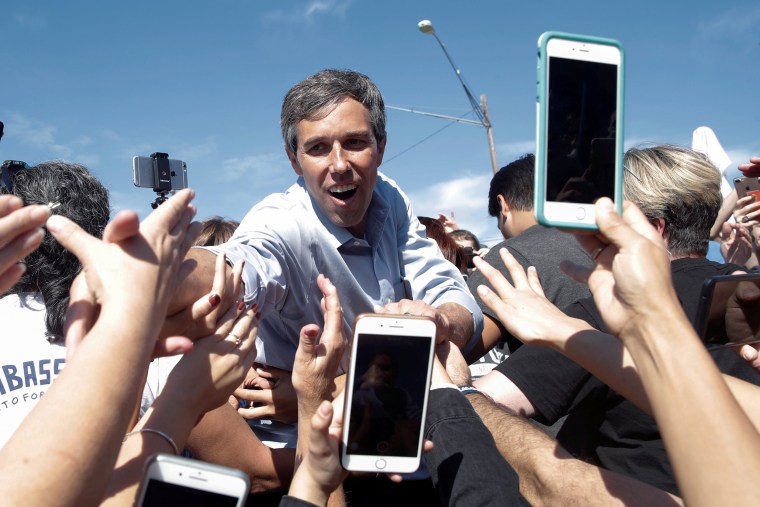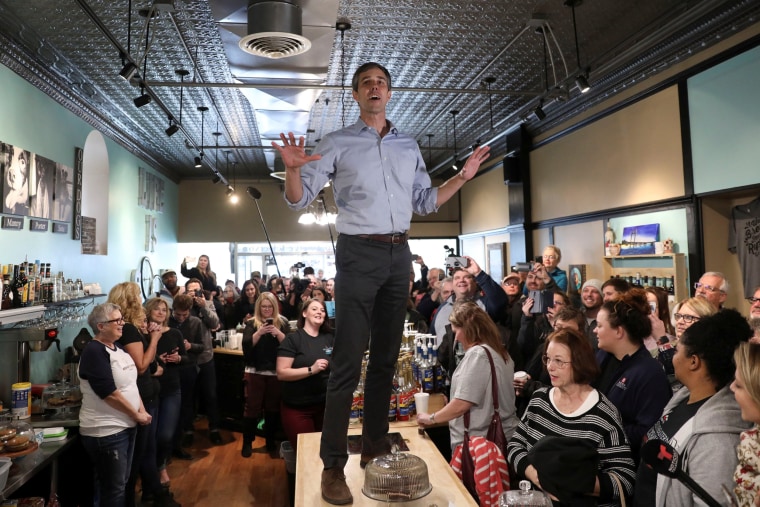BURLINGTON, Iowa — A lot has changed in the Democratic party in the six months since Beto O'Rourke was its biggest fascination.
The crowded 2020 Democratic presidential field that O'Rourke joined on Thursday has supercharged the pace of policy innovation as candidates looking to stand out push ideas like boosting the number of justices on the Supreme Court, slavery reparations, breaking up Facebook, the Green New Deal, new ways to tax the rich, and much more.
"We're in a revolutionary moment," said Alexandra Rojas, executive director of the left-wing group Justice Democrats. "The progressive movement wants to see candidates that are not only calling for these progressive policy visions now, but also who is going to take on the people that have been halting progress for a long long time."
Where does O'Rourke — whose new campaign website offers no policy ideas — fit in this new playing field?
Depending on who you ask, he's either arriving late to a battle of ideas he's not equipped to fight or he's smartly coasting above the fray of the internecine wars of Twitter activists that few voters really care about.
"Campaigns aren't typically won based on a side-by-side of issues, but instead by voters judging the character and vision of candidates," said Ben LaBolt, a former aide to Barack Obama.
After all, some of the most successful politicians of recent years, including Obama and Donald Trump, were dismissed by critics as celebrities lacking substance and experience in government — all sizzle. Obama especially, like O'Rourke, spoke in a way that allowed supporters to project onto him what they wanted to believe.
Obama, Trump and Sen. Bernie Sanders, I-Vt., all had defining policy issues that helped them stand out not only from the other side but from their own party.
For Obama, it was the Iraq War, the defining policy issue of his time; for Trump, it was immigration; for Sanders, it was and is taking on the establishment.
"The most compelling vision is often animated by great policy ideas, and then-Senator Obama used his decision-making on critical policy issues like opposing the war in Iraq to differentiate his judgment from his opponents," LaBolt said.
For O'Rourke, that keystone idea is less clear.
And now he'll have to face questions from voters and the media on a whole host of thorny issues, as he did on his first campaign swing on Thursday, that divide Democrats and would likely carrying baggage in the general election.
They're exactly the kinds of issues that O'Rourke skirted last year when the entire Democratic Party was united behind his effort to defeat Sen. Ted Cruz, R-Texas.
But he began to face those questions as soon as he touched down in the first caucus state in the nation.
A voter in Fort Madison asked O'Rourke about "Universal Basic Income," the idea of the government paying every American a guaranteed basic salary, and the candidate ended up talking about rural broadband and Tinder.
A local radio reporter questioned O’Rourke about Medicare for All, and he responded that he's focused on a "goal that is separate from any labels," though he did say he likes a new bill that would allow Americans to buy into Medicare but keep private insurance in place.

He came closest to making policy news when a voter in Burlington asked about adding more justices to the Supreme Court to tilt its ideological balance.
"There's nothing in the Constitution that defines how many people should sit on that court," O'Rourke said. "What if there were five justices selected by Democrats, five Justices selected by Republicans, and those 10 then picked five more justices independent of those who chose the first 10? I think that's an idea that we should explore."
That kind of public deliberation is exactly what many supporters like about his approach to policy. They say O'Rourke, instead of being confined by ideology, is open-minded and flexible, wanting to hear the evidence before making up his mind.
"There's no sense in campaigning if you already know every single answer," O'Rourke said Thursday.
And at least so far, voters here don't seem to mind — they just like him in a way they sometimes have trouble describing.
Marcia Armstrong, 67, said she had been depressed for two-and-half years since Hillary Clinton lost to Trump, but that that ended at a sub shop in Fort Madison when she met O'Rourke.
"It's like a ton of bricks have been lifted off my shoulder," Armstrong said. "He's what we need."
But some on the left, who have been generating most of the hot new ideas in the party, said what they are hearing from O'Rourke sounds like mushy pablum designed to obscure a mixed ideological track record.
"If Beto was still in the House, he would be on my top list of Democrats to primary," said Sean McElwee, founder of the left-wing think tank Data for Progress. "The only thing he's ever done for the progressive movement is retire from the House and be replaced by a more progressive woman of color."
O’Rourke, however, has shown a willingness to take on boldly on unsafe ideas.
He's been a vocal advocate of criminal justice reform and marijuana legalization for years, long before those issues caught on in his party.
He challenged the Obama White House on immigration, privacy and its military intervention in Syria.
And during his campaign against Cruz, he swore off PAC donations of any kind and called for impeaching Trump when almost any Democratic consultant in America would have strongly advised him against that in a Texas statewide contest.
Democratic activist Billy Freeland, who goes by the Twitter handle “@policyjunkie,” defended O'Rourke's policy chops in a Houston Chronicle op-ed.
"He's not the only candidate among the likely 2020 Democratic field to champion these policies, but O'Rourke has consistently and successfully raised the profile of these issues," Freedland wrote. "He also proved he had the political courage to do so unabashedly in all 254 counties of Texas."

